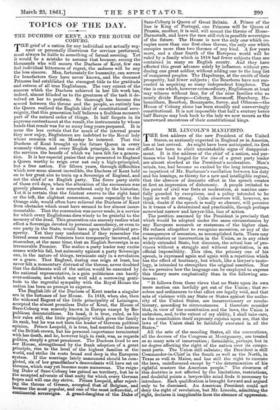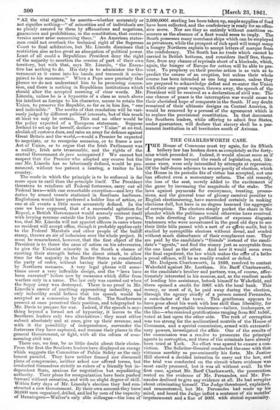MR LINCOLN'S MANIFESTO.
THE first address of the new President of the United States, as anxiously expected in England as in America, has at last arrived.. As might have been anticipated, its first effect has been to elicit unmistakable signs of disappoint- ment. It is the address of the chief of a nation, and par- tisans who bad longed for the rise of a great party leader are almost shocked at the President's moderation. Men's minds, too, had become so excited by the long interregnum, so impatient of Mr. Buchanan's vacillation between his duty and his leanings, so thirsty for a new and intelligible regime, that the absence of dramatic effect in the speech creates at first an..impression of dishonesty. A people irritated to the point of civil war frets at moderation, at maxims care- fully guarded by exceptions, and a policy, intended to be legal as well as strong. Calm observers will, however, we think, doubt if the speech is really so obscure, will perceive in it traces of a determined and practicable, though perhaps somewhat narrow and lawyer-like, line of action. The position assumed by the President. is precisely that which would be adopted under the same circumstances by any. European monarch or statesman of the higher class. He refuses altogether to recognize secession, or any of the consegnences of secession, as accomplished facts. There may be revolution or insurrection in the Union, as in any other widely extended State, but disunion, the actual loss of pro- vinces without a struggle and without negotiation, is an official ,This idea; the primary one of his speech, is expressed again and again with a repetition which has the effect of hesitancy, but which, like a lawyer's tauto- logy, is intended to strengthen the original assertion. Nor do We perceive how the language can be employed to express this theory more emphatically than, in the following sen- tences: "It follows from these views that no State upon its own mere motion can lawfully get out of the Union ; that re- solves and ordinances to that effect are legally void, and that acts of violence with any State. or States against the autho- rity of the United, States, are insurrectionary or revolu- tionary,. according to circumstances. I therefore consider that, in view of the constitution and the laws, the Union is unbroken, and, to the extent of my ability, I shall take care, as the constitution, itself expressly enjoins upon me, that the laws of the Union shall, be faithfully executed in all the States."
All the acts of the seceding States, all the conventions, all the decrees of the Congress at Montgomery, are treated as so many acts of insurrection; formidable, perhaps, but in no degree affiacting the right of the nation over its compo- nent parts. The Union still subsists ; the President is still Commander-in-Chief in the South as well as the North, in Texas as well as Maine, and has still the right to execute the laws, uninflnenced except by "the determination of his rightful masters the American people." The clearness of this doctrine is not affected by the limitations, restrictions, and doubtful points a lawyer-like mind finds it necessary to introduce. Each qualification is brought forward and argued only to be dismissed. An American President could. not deny the right of revolution, but Mr. Lincoln, admitting the right, declares it inapplicable from the absence of oppression. "All the vital rights," he asserts—whether accurately or not signifies nothing—" of minorities and of individuals are so plainly assured to them by affirmations and negations, guarantees and prohibitions, in the constitution, that contro- versies never arise concerning them." An American states- man could not overlook the technical right of the Supreme Court to final arbitration, but Mr. Lincoln dismisses that restriction also as too great an abnegation of political power. Least of all could a Republican President deny the right of the majority to sanction the cession of part of their own territory, but with that, says Mr. Lincoln, "the Execu- tive has nothing to do. His duty is to administer the Go- vernment as it came into his hands, and transmit it unim- paired to his successor." When a Pope uses precisely that phrase we do not understand him to be promising conces- sion, and there is nothing in Republican institutions which should alter the accepted meaning of clear words. Mr. Lincoln, unless he is a hypocrite of a class as much above his intellect as foreign to his character, means to retain the Union, to preserve the Republic, so far as in him lies, "one and indivisible." The merits of that resolution will be vari- ously judged by different political interests, but of this much at least we may be certain. This and no other would be the policy expected of a European statesman. Suppose Ireland to set up for herself, declare our "Union" at an end, abolish all customs dues, and raise an army for defence against Great Britain and the world,—would a Premier be expected to negotiate, or to recognize secession, or to frame a new Act of -Union, or to argue that the Irish Parliament was a nullity, Irish acts treasonable, and the rights of the central Government de jure unimpaired 2 We cannot but suspect that the Premier who adopted any course but the one Mr. Lincoln has so laboriously defined, would be pro- nounced, without too patient a hearing, a traitor to his country.
The mode in which the principle is to be enforced is far more open to cavil than the principle itself. The President threatens to reinforce all Federal fortresses, carry out all Federal laws—with one remarkable exception—and levy the duties by armed vessels stationed in Southern harbours. Englishmen would have preferred a bolder line of action, or one at all events a little more accurately defined.. In the • case we have supposed, that of a successful agitation for Repeal, a British Government would scarcely content itself with levying revenue outside the Irish ports. The proviso, too, that Mr. Lincoln will not appoint officers in cases where no resident will accept office, though it probably applies only to the Federal Marshals and other people of the bailiff stamp, throws an air of indecision over the whole project. It must be remembered, however, that the first object of the President is to throw the onus of action on his adversaries, to give the Unionist minority in the South a chance of exerting their strength before the direct attack, to allow time for the majority in the Border States to consolidate the party of order, without having their pride alarmed by Northern menaces. A very legal phrase will some- times cover a very inflexible design, and the "laws have been executed" before now by measures which differ from warfare only in a name. The law only was carried out when the Sepoy army was destroyed. There is no proof in Mr. Lincoln's career of anything approaching imbecility, and only imbecility could believe that his speech would be accepted as a concession by the South. The Southerners present at once perceived their position, and telegraphed to Mr. Davis to prepare for war. Indeed, if the speech is any- thing beyond a formal act of hypocrisy, it leaves to the Southern leaders only two alternatives : they must either submit absolutely and at once, give up their revenue, and with it the possibility of independence, surrender the fortresses they have captured, and resume their places in the general Government, or fight, with all the odium of com- mencing civil war.
There can, we fear, be as little doubt about their choice. From the first the Southern leaders have displayed an energy which suggests the Committee of Public Safety as the only honest parallel. They have neither framed nor discussed plans of compromise, neither asked nor offered terms, but conducted themselves strictly as rulers of a friendly but in- dependent State, anxious for negotiation but repudiating authority. Their plans for reorganization have been pushed forward without cessation, and with no slight degree of skill. Within forty days of Mr. Lincoln's election they had con- structed a new Government. By their own account they have 30,000 men organized, drilled, and led by men of the -capacity of Henningsen—Walker's only able colleague—the loan of 3,000,000/. sterling has been taken up, ample supplies of food have been collected, and the confederacy is ready for an offen- sive move. Nor are they so entirely without maritime re- sources as the absence of a fleet would seem to imply. The South possesses many merchant ships which can be employed as privateers, while the prospect of rich spoil will tempt many a hungry Northern captain to accept letters of marque from the confederacy. The South has no trade which cannot be carried in British bottoms, and considers itself free, there- fore, from any chance of reprisals short of a blockade, which, again, the hunger of Europe for cotton will be able to pre- vent. To prophesy on their precise action is as vain as to predict the course of an eruption, but unless their whole course has been intended as one long menace, unless they are prepared to acknowledge defeat and re-enter the -Union with their one great weapon thrown away, the speech of the President will be received as a declaration of civil war. The one chance of peace is the interruption war would cause to their cherished hope of conquests in the South. If any doubt remained of their ultimate designs on Central America, it would be removed by a perusal of the agreement which is to replace the provisional constitution. In that document the Southern leaders, while offering to admit free States, under guarantees, will declare that slavery shall be a per- manent institution in all territories south of Arizona.































 Previous page
Previous page